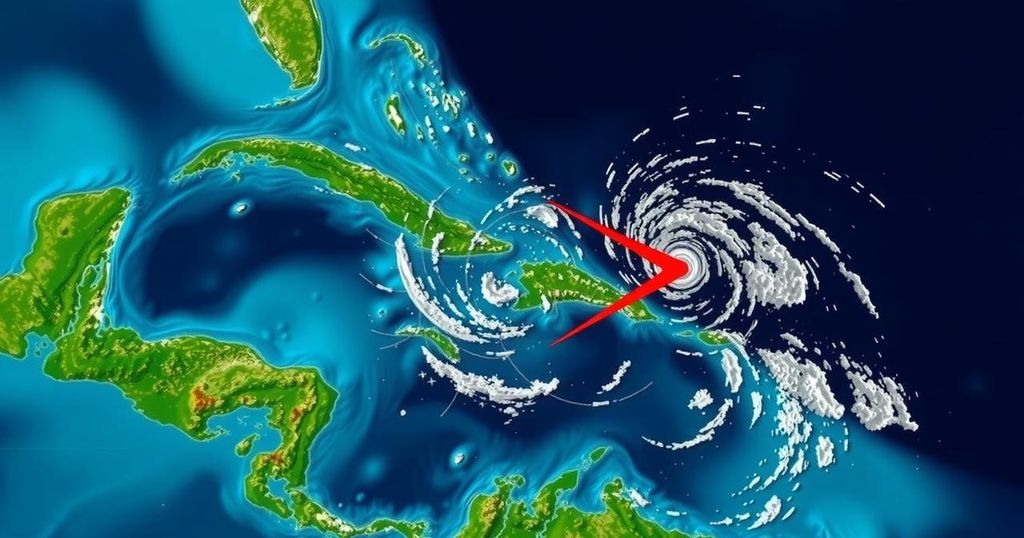Tropical Storm Oscar Approaches Bahamas Following Impact on Cuba
Tropical Storm Oscar is moving toward the Bahamas after impacting Cuba as a Category 1 hurricane, resulting in six fatalities. Forecasters predict heavy rainfall across the Bahamas, while Oscar is recognized as the smallest hurricane on record. The ongoing hurricane season is projected to be above average due to high ocean temperatures.
Tropical Storm Oscar is progressing toward the Bahamas after making landfall in Cuba as a Category 1 hurricane, which has resulted in the unfortunate deaths of at least six individuals due to heavy rainfall. As of Tuesday morning, the storm was situated approximately 45 miles (75 kilometers) south-southeast of Long Island, Bahamas, with sustained winds of 40 mph (65 kph) and a north-northeast travel speed of 12 mph (19 kph), as reported by the National Hurricane Center in Miami. At this moment, Oscar is considered to be barely a tropical storm. Forecasters anticipate that the storm may deliver as much as 5 inches (13 centimeters) of rain across the southeastern Bahamas, with isolated areas potentially receiving up to 8 inches (20 centimeters). Consequently, a tropical storm warning is currently in effect for the central and southeastern regions of the Bahamas. Noteworthy is the historical aspect of Oscar, which is recognized as the smallest hurricane on record, with a wind field spanning only about 6 miles (10 kilometers). Its landfall in Grand Inagua Island, Bahamas on Saturday, followed by a second landfall in eastern Cuba late on Sunday, caught many meteorologists off-guard. Michael Lowry, a hurricane specialist, reflected on this unprecedented event, stating that, “It’s not often we see a colossal failure in hurricane forecasting,” noting that none of the predictive models suggested that Oscar would escalate into hurricane status. In Cuba, Oscar yielded at least 15 inches (38 centimeters) of rain in parts of eastern regions, leading to significant flooding and the potential for landslides. Reports confirm that the six fatalities occurred in the Guantánamo area. The storm’s impact is compounded by an ongoing power crisis in Cuba, further exacerbating the situation and sparking minor protests, which have prompted stern governmental warnings against unrest. Oscar marks the 15th named storm and the 10th hurricane of this Atlantic hurricane season, which spans from June 1 to November 30. The National Oceanic and Atmospheric Administration has forecasted an above-average hurricane season due to exceptionally high ocean temperatures, predicting between 17 to 25 named storms, including four to seven major hurricanes categorized as Category 3 or higher. Concurrently, Tropical Storm Kristy is located in the Pacific Ocean, about 375 miles (605 kilometers) west-southwest of Acapulco, Mexico, with expectations of developing into a hurricane by nightfall.
The Atlantic hurricane season officially begins on June 1 and concludes on November 30. During this period, meteorologists and climatologists closely monitor storm formation and intensity due to the increasing likelihood of hurricanes developing in the warmer waters of the Atlantic Ocean. The National Oceanic and Atmospheric Administration (NOAA) utilizes predictive models to forecast these storms and warn affected regions about potential impact. Recently, the storm season has been complicated by unprecedented ocean temperatures, which contribute to a higher frequency and intensity of storms, compelling authorities to remain vigilant. Tropical Storm Oscar exemplifies the volatile nature of storms during this active season, making history as the smallest hurricane recorded.
In summary, Tropical Storm Oscar has rapidly transitioned into an impactful storm, causing destruction and loss of life as it continues toward the Bahamas following its landfall in Cuba. The storm’s unusual size and unexpected classification as a hurricane highlight the complexities of weather forecasting. With forecasts predicting a busy hurricane season ahead, the necessity for preparedness in vulnerable regions becomes even more critical.
Original Source: www.seattletimes.com




Post Comment